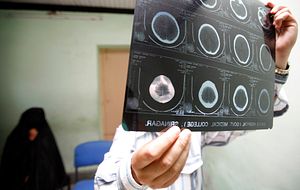According to the World Health Organization’s Mental Health Atlas of 2011, India’s mental health care is underfunded. India spends a mere 0.06 percent of its health budget on mental care, compared to developed nations such as the United States, which spends 6.2 percent of GDP on mental health, and England which spends 10.82 percent. Even Bangladesh trumps India on its mental health expenditure budget.
According to the India’s health ministry, 6-7 percent of India’s population suffers from psychosocial disabilities — roughly 75 million people. Yet India has a psychiatrist to patient ratio of one psychiatrist for every 343,000 patients. The state of many government run mental institutions is less than adequate, with some patients sleeping on the floor because there aren’t enough bed frames.
I was born in India and live in Jamaica, which has a population of approximately 2.7 million. The Ministry of Health in Jamaica has been trying to develop a comprehensive community mental health system for many years and it is still a work in progress. The country is attempting to scale down operations at its biggest mental health hospital, known as the Bellevue Hospital, and use the resources to pump infrastructure into community mental health services. I believe Jamaica has a mental health system that the current Indian government can employ, which may help reduce inpatient admission and in the long term reduce long term psychiatric burden and stigma.
Many health centers or clinics exist in most communities in Jamaica and are staffed by trained psychiatric consultants or resident psychiatrists in training. Also present are mental health officers who are registered nurses and have taken addition psychiatric specialist training. They are trained by Jamaica’s Ministry of Health and undergo courses which include general medicine, psychiatry, psychology, social work, psychopharmacology, and patient management. There are significant differences between a mental health officer and a community psychiatric nurse. The MHO can reinstitute treatment for patients with a history of noncompliance and is designated by the mental health act to initiate a patient’s detention at a psychiatric facility.
The clinics where they work are equipped with oral medications and injectable depot medications. The community health “teams” have what is known as a crisis ambulance and respond to emergency calls from distraught family members or concerned citizens about patients who may be a risk to self or others. The patients are attended to and then brought for treatment to a centralized hospital. That being said, most people are treated in the community itself with intramuscular antipsychotic medications. If admitted, those who are considered stable for discharge after a period of stabilization are discharged to the care of mental health officers in the community, who often work in liaison with the inpatient team. Their role also includes providing psychoeducation to patients’ families, who are critical in preventing relapse and noncompliance.
Some of the health centers have specialized services which cater to the needs for specialized psychiatric populations such as children and the elderly. Care in the community setting is shared with the family, which serves as the backbone for sustained recovery. The community team also does frequent “home visits” to provide treatment and follow up, especially if the patient lives far from a hospital or health center or if the family does not have adequate resources to bring the patient in for treatment. Mental health officers often provide patient’s relatives their telephone numbers in case of emergencies and some live in the community they serve, which provides open access to mental health care.
The main barrier to treatment in the community is stigma associated with access to mental health care. Many patients and their relatives are reluctant to seek treatment at health centers in their own community due to fear of being ridiculed. This issue is being dealt with by offering health promotion services to patient and families, which includes techniques for stress and anxiety management, conflict resolution, and substance use. Many patients in the community also carry dangerous weapons at times and mental health officers face on the job hazards and at times lack proper support by security forces.
That being said, the advantages of this model cannot be denied. Mental health officers are significantly cheaper to train compared to doctors, and in countries like India where there are significant doctor shortages, especially in a field such as psychiatry, community treatment by mental health officers could offer an alternate care strategy. For this model to be developed cohesion needs to be present between psychiatrists, primary care doctors, and mental health officers to provide adequate services. In the long term the idea is to decrease admissions to the hospital, which many argue is associated with greater stigma and difficulty associated with reintegrating back into society after discharge. For this system to work, mental health officers need to be provided with a level of autonomy and ability to work independently.
In conclusion I urge the current Modi government to take the mental health officer model into serious consideration. India faces massive challenges to get mental health care treatment right and mental health hospitals are in disarray all over the country. Community treatment offers a cheaper, effective approach to safe and comprehensive treatment.
Ashish Sarangi is a practicing medical doctor currently doing an M.D. in Psychiatry at the University Hospital of the West Indies in Kingston, Jamaica. Dr. Sarangi was born and brought up in India.

































